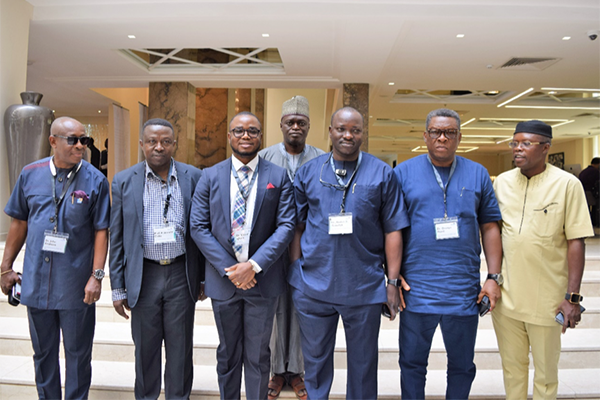The Challenge Initiative (TCI) in Nigeria organized a Grant Management Orientation and Stakeholders’ roundtable in Abuja on September 6-7, 2018 to encourage states participating in TCI to make a commitment to lead their family planning interventions and ensure progress in those interventions. The roundtable brought together key decision-makers from TCI-supported states, including Commissioners for Health, Directors from the states’ Primary Healthcare Board and the states’ Ministries of Health, as well as Program Officers from the Saving One Million Lives (SOML) project and State Reproductive Health Coordinators.

From Left to Right: Dr. John Ahukanna, Hon. Commissioner for Health, Abia State; Prof. Princewill Chike, Hon. Commissioner for Health, Rivers State; Dr. Victor Igharo, TCI Chief of Party in Nigeria;Dr. Moses Obadiah, Permanent Secretary, Taraba State Ministry of Health; Dr. Kuden Kamshak, Hon. Commissioner for Health, Plateau States; Dr. Ononye Mordi, Hon. Commissioner for Health, Delta State; and Dr. Joe Akabuike, Hon. Commissioner for Health, Anambra State. Photo Credit: Nneoma Anieto
To inspire a change in mindset and impress upon the states the need to commit to using proven family planning interventions, the Initiative facilitated a group exercise where participants were asked to conduct a self-audit on the status of the family planning landscape in their particular state. During the self-audit, states were also asked to outline what they were willing to do to improve their family planning interventions. The exercise allowed them to critically assess their own family planning landscape, identify steps for improving it and then take the lead in identifying solutions to address their family planning issues. The states concluded that budgeting for family planning and releasing those budgeted funds were the key steps to take to transform their family planning landscape.
During the meeting, the states also recognized opportunities for mobilizing resources for family planning after TCI’s Nigeria Chief of Party Dr. Victor Igharo explained how SOML resources can be leveraged to meet the states’ family planning requirements.
“TCI says we want to move the needle; do you have the resources available to move the needle? SOML gives you resources and the leeway to achieve results with those resources,” Igharo said. “Through TCI, SOML funds can be employed to match TCI funds for better results.”
Dr. Mina Whyte from Rivers State noted that SOML resources were critical and could be used to achieve TCI goals. She commended TCI for its collection of proven approaches to guide program implementation.
“It is impressive that there are already proven interventions that TCI provides for states to adapt. SOML gives you money and sets objectives for you to achieve, then leaves you to figure out how to achieve these objectives,” Whyte said. “TCI has proven-to-work models for achieving these objectives.”

TCI Chief of Party Igharo (left) presents a letter of commitment to Dr. John Ahukanna, Commissioner for Health Abia State, while Olusina Olulana (second from left), Deputy Portfolio Director NURHI/TCI, and Moses Ayanwusi (right), Portfolio Director Finance and Administration, look on. Photo credit: Nneoma Anieto
Igharo presented TCI’s Grant Management Framework while explaining TCI’s commitments to the states and encouraging them to use their positions to facilitate the release of their funding. He also emphasized the value of strategic partnerships with other implementing partners in bringing sustainable change, reiterated the need for states to have a unified family planning strategy and asked them to coordinate the implementing partners in their states.
Stakeholders at the meeting commended TCI for distinguishing itself from other implementing partners with its openness and said that lessons from the meeting would guide their interactions with other partners implementing health programs in their states.
“We are happy that TCI is open enough to show us how the funds will be spent,” said Dr. Kuden Kamshak, the Commissioner for Health from Plateau State. “We need other partners to be this transparent so that we will know how much we spend on health in our state.”


